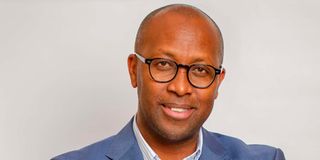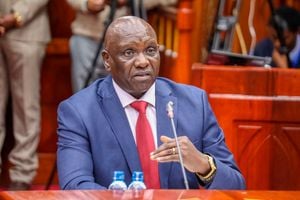Why Dr Githinji left the stage at UN Assembly

Global CEO of Amref Health Africa Dr Githinji Gitahi.
What you need to know:
- An all-male panel discussing issues that disproportionately impact women prompted the CEO of Amref Health Africa to walk off stage in protest.
- Studies show women are underrepresented as experts on panels.
- To achieve balanced representation, intentional efforts are needed from organizers to include women experts and create a safe environment for their participation.
At this year's UN World Health Assembly, Githinji Gitahi, global CEO of Amref Health Africa, explained his abrupt departure from the stage during last year's summit.
He found himself on an all-male panel discussing an issue that disproportionately harms women, which he described as an awkward situation. Gitahi made a statement by vacating his chair, inviting any qualified woman to take his place before walking off.
“It’s not just about fairness; it’s about getting the job done well. A woman is the best public health officer I’ve ever met. My mother had nine children, no education, married at 17, and gave birth in 1952 during the war, with no medical help. She alone ensured our survival,” he explained.
“With women-led and women-responsive policies, we see less child and maternal mortality, less malaria, less malnutrition. Fewer people die.”
The phenomenon of all-male panels, or "manels", is common not only in global forums like the UN World Health Assembly but also locally.
Recently, Kenyan discussions on the Finance Bill 2024, have prominently featured male experts, despite the presence of numerous female financial and legal experts.
On May 14, a mainstream news broadcaster hosted a discussion on the Finance Bill's first reading with four male panellists moderated by a male news anchor. The same outlet later discussed the bill's implications on the manufacturing industry, again with only male panellists.
This trend is often seen in panels addressing national issues and in fields where women are underrepresented.
A study conducted by Aga Khan Graduate School of Media and Communications titled "The State of Women in the Media: Representation, Coverage and Framing of Women in East African Media" sought to establish the main actors in news articles featuring women and their roles. The main actor is the person mentioned or referenced most in the news articles, such as an expert.
It was found that more than half (54 per cent) of all the analysed articles from the six newspapers in the three countries (Kenya, Uganda and Tanzania) had women acting in non-traditional roles as experts and treated as experts first and not women experts as the main actors. However, 13 per cent of newspapers in East Africa still portrayed women in traditional roles such as homemaker.
The report also noted that the projection of women as experts in non-traditional roles helps media consumers perceive women in a fashion that normalizes women’s roles in these non-traditional roles.
In a Daily Nation editorial, Gender Editor Dorcas Muga noted that when she reached out to sources for a national story, most women were hesitant to be featured.
Janet Mbugua, an experienced panellist and moderator, explains this reluctance:
"Many times, women panellists face rude interruptions and have fellow panellists try to shut them down. This affront to the agency of women includes online violence, stalking, harassment, and dismissing their opinions as inferior," she tells nation.africa, adding that such bullying often continues online after the event.
Jane Godia, Director of Africa Women in News (WIN), highlights that the notice given to women for panel participation is often too short, making it seem like an afterthought.
“Late-night or early-morning panels also pose safety concerns and fail to consider the roles women play in society and within their families. Most significant interviews are scheduled at times that are not women-friendly,” she says.
To ensure equal representation, Janet advises that moderators, event planners, and curators need to be intentional in balancing participants.
“Without this effort, we risk hearing biased opinions. Additionally, it is crucial to protect panellists online after the sessions, as this is when they can face significant challenges,” she says.
Jane Godia recommends approaching women without intimidation, giving enough notice for preparation, and considering recorded or hybrid interviews to accommodate women's schedules. She adds that it is important to recognise that women's expertise can address national issues, not just women's issues.




